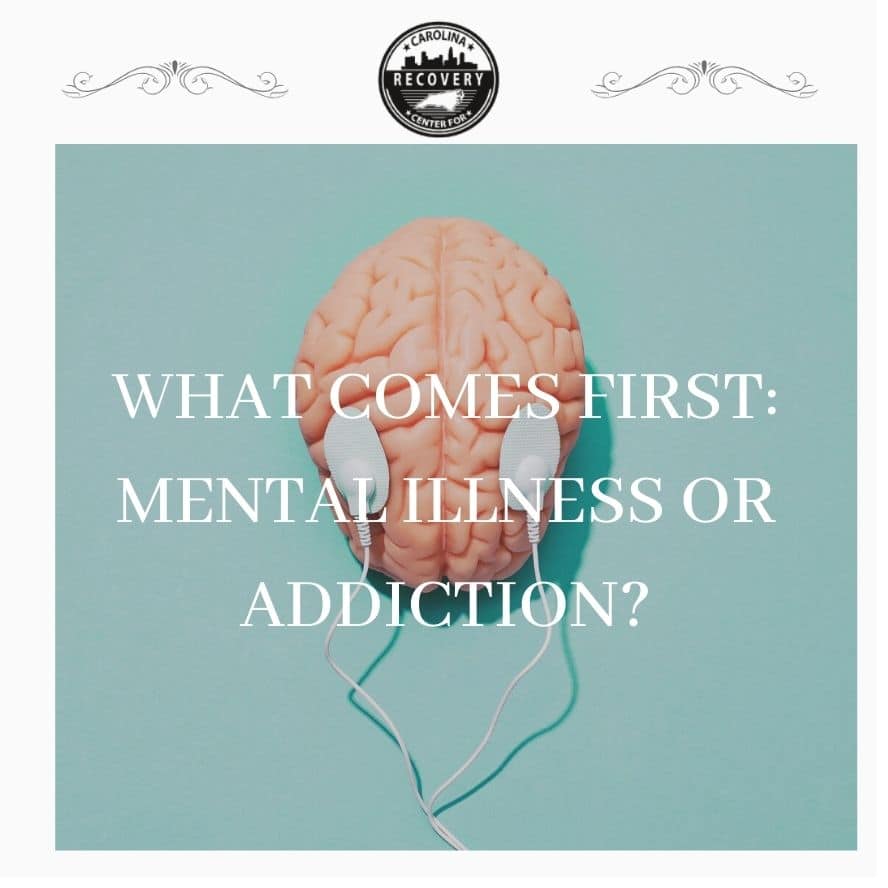What Comes First: Mental Illness or Addiction?

Medically Verified: 2/1/24
Medical Reviewer
Chief Editor

All of the information on this page has been reviewed and verified by a certified addiction professional.
Co-occurring mental illness and addiction are extremely common. According to the National Institute on Drug Abuse, nearly half of individuals who experience mental illness in their lives will also experience a substance use disorder, and vice versa. Studies suggest this number is even higher in adolescents, with more than 60% of youth who seek treatment for substance abuse meeting the diagnostic criteria for another mental health condition.[1]
When a mental health condition and a substance use disorder co-exist, they are referred to as co-occurring disorders or dual diagnoses. Rarely do a substance use disorder and a mental illness develop at exactly the same time. Instead, it is more of a chicken-and-egg type situation. It isn’t always easy to tell whether mental illness or addiction comes first, and it is often different from one person to the next.
Sometimes mental health concerns develop as a result of addiction. Other times, addiction develops as a result of self-medicating a mental illness. Regardless of whether mental illness or addiction came first, treatment for co-occurring disorders is the same as it aims to treat both disorders simultaneously.
Dual Diagnosis: The Connection Between Mental Illness and Addiction
Although substance use disorder and other mental health conditions commonly co-occur, this does not mean one always causes the other.[2] Sometimes, people struggle with dual diagnosis because both addiction and mental illness have similar risk factors, such as:
- Genetics
- Environmental factors (stress or trauma)
- Homelife
- Economic factors
However, studies have found that people with mental health conditions, such as anxiety, depression, or PTSD are more likely to self-medicate using drugs or alcohol. This act of self-medication can easily spiral into an addiction. On the other hand, studies also show how chronic drug and alcohol use can trigger changes in the brain and lead to the development of a mental disorder. By examining a person’s past behaviors and patterns, doctors and therapists may be able to tell if mental illness or addiction came first.
When Mental Illness Comes First
When asking the question, “what comes first? Mental illness or addiction?” Many people believe the answer is mental illness. This is true in some circumstances and is often the result of self-medication.
Take someone with PTSD for example. This person may have anxiety throughout the day and flashbacks that make it difficult to function at work. He or she may have extreme insomnia or nightmares that make sleep a terrifying experience. It’s no secret that living with PTSD is difficult, but it is so difficult that many people with PTSD try to numb their symptoms by using drugs or alcohol. In fact, people with PTSD are 2-4 times more likely than those without to develop a substance use disorder.[3]
Whether a person is trying to cope with PTSD, anxiety, depression, schizophrenia, or any other mental disorder, coping by means of drugs and alcohol is never the solution. Individuals begin to depend on substances to feel calm, relaxed, or happy. They soon feel as though they cannot function without substances. And, in many situations, substance abuse only worsens symptoms of mental health, leading to a domino effect.
When Addiction Comes First
Sometimes, addiction comes before mental illness. Drugs and alcohol, over time, make changes in the structure and function of the brain. They alter how receptors interpret information from neurotransmitters and change the way the brain produces essential chemicals like dopamine, serotonin, and GABA.
When the brain doesn’t have the right chemical balance, people begin experiencing adverse mental health symptoms. People who were completely healthy before their addiction may begin struggling with anxiety, depression, or bipolar disorder. For example, studies show that the more a person drinks, the more likely they are to develop major depression, even if they never struggled with depression before.[4]
In the end, both addiction and mental illness make each other worse. They can also make recovery challenging.
Whether Mental Illness or Addiction Comes First, Treatment is The Same
Ultimately, it doesn’t matter whether mental illness or addiction came first. What matters is getting individualized therapy for both conditions. According to the National Institute of Mental Health, it is always best to treat substance use disorder and mental health conditions together rather than separately.[2]
Dual diagnosis therapy generally involves:
- Behavioral therapies – Therapies like CBT, DBT, CM, and family therapy all show promise for treating individuals with co-occurring disorders.
- Medications – Medication can be prescribed to help reduce a person’s symptoms. The exact medication will depend on the person’s mental health diagnosis and how they respond to behavioral therapy.
- Lifestyle changes – These include keeping a daily schedule, developing a healthy routine, eating a balanced diet, getting plenty of exercise, and using coping skills in day-to-day life.
- Peer support – Loneliness can trigger mental health symptoms and addiction cravings, but peer support can do the opposite. Peer support can also improve a person’s quality of life.
Most importantly, treatment should consider a person’s individual needs, beliefs, circumstances, faith, and culture. The more personalized treatment is, the more successful the patient will be in overcoming their co-occurring disorders.
Start Dual Diagnosis Treatment in North Carolina Today
If you struggle with co-occurring disorders, whether mental illness or addiction came first is not what you should be focused on. Instead, you should focus on obtaining the help you need and improving your life. Here at Carolina Center for Recovery, our dual diagnosis treatment programs can help you get back on your feet. Learn more about our treatment program or enroll today by speaking with an admissions counselor.
References:
- https://www.drugabuse.gov/publications/research-reports/common-comorbidities-substance-use-disorders/part-1-connection-between-substance-use-disorders-mental-illness
- https://www.nimh.nih.gov/health/topics/substance-use-and-mental-health/
- https://www.ncbi.nlm.nih.gov/pmc/articles/PMC3811127/
- https://www.ncbi.nlm.nih.gov/pmc/articles/PMC3658562/

